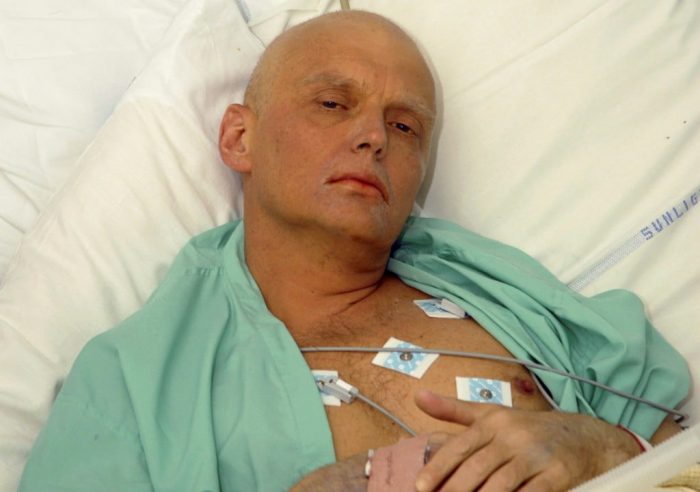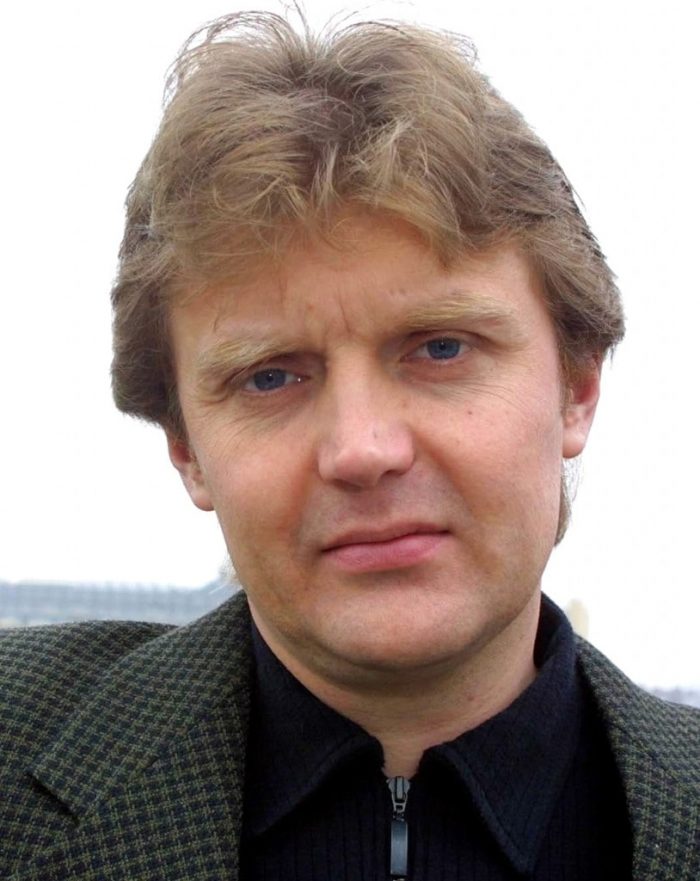With his dying words, poisoned spy Alexander Litvinenko named Putin as his killer
January 28, 2015

The spy, who had fled Russia for London, dictated a widely trumpeted statement just before his death. He fingered Putin. “You may succeed in silencing me, but that silence comes at a price,” Alexander Litvinenko said. “… The howl of protest from around the world will reverberate, Mr. Putin, in your ears for the rest of your life.”
Within days, Putin questioned that letter’s authenticity, calling it “political provocation.” But this letter wasn’t the whole of Litvinenko’s final remarks. He also gave detailed interviews to British authorities — comments that have, until Tuesday, remained sealed.
But now, in what was an explosive beginning of a British public inquiry into Litvinenko’s death, those statements have been revealed as well as key investigative findings that appear to support allegations that two former Russian KGB were directly responsible. They left a trail laced with polonium — a “path of breadcrumbs left by Hansel and Gretel,” said Ben Emmerson, a lawyer representing Litvinenko’s wife, according to the Guardian.
Those breadcrumbs showed radioactive polonium on the table and chairs where Litvinenko met with Andrei Lugovoi and Dmitry Kovtun, both of whom have been charged with murder. And it was all over the Russian KGB agents’ hotel rooms, as well as contaminating one’s hotel bathroom.
And according to deceased, those crumbs led back even further. “I have no doubt whatsoever that as soon as the power changes in Russia, or when the first officer of the Russian secret services defects to the West, he will say that I have been poisoned by the Russian special services on Putin’s order,” he said, according to the Guardian.
“The trail of polonium traces leads not just from London to Moscow but directly to the door of Vladimir Putin’s office,” Emmerson said. “Mr. Putin should be unmasked by the inquiry as nothing more than a common criminal dressed up as a head of state.”
The inquiry was announced by the British government in July, 2014, after it had resisted it for several years fearing the disclosure of intelligence secrets.
According Robin Tam, counsel to the inquiry, one of the accused asked a friend before Litvinenko’s death whether he knew any cooks who could “put poison into Mr. Litvinenko’s food or drink. He said he had a very expensive poison.”
But this being a Russian spy saga — one that severely damaged Russia’s relationship with Britain — nothing is quite as it first appears. The easiest portrayal: Litvinenko the martyr, who went down fighting the villainous Kremlin. And that very well may be what transpired. According to a BBC report on Tuesday, there were two prior attempts to kill Litvinenko before his poisoning. But this is a cast of characters in which no one was who he seemed.
“The story, like most good spy yarns, is nowhere near as black-and-white as the tabloids would have you believe,” wrote journalist Bryan Burrough in Vanity Fair. “Among the few things known for sure is that Litvinenko was neither the saint nor the famous dissident the press wanted him to be.” He was, in fact, a resentful man who made a slew of enemies and, as months gave way to years, grew increasingly paranoid and frustrated that few paid his manifestos heed.
“The tragedy of Litvinenko is that, throughout his life, people wouldn’t listen to him,” friend Andrei Nekrasov, a Russian filmmaker and friend, told Burrough. “To the end, he was frustrated. So frustrated. Because no one was listening. No one. Now they’re listening.”

Like most who consider themselves whistleblowers, Litvinenko was a man scorned. Once a fast-rising intelligence operative, he caught on with Russia’s spy agency, the Federal Security Service (FSB), in the 1990s, but soon became disillusioned. In 1998, he met Putin when Putin was in charge of the FSB. The two clashed, and soon Litvinenko granted a television interview in which he said he had been ordered to kill a prominent Russian oligarch. “He went on television … saying that their superiors in a specific department ordered them to kill people,” Nekrasov told USA Today in 2006. “They … knew they would be sacked or worst, arrested.” In fact, Litvinenko feared even worse — and he and his wife soon fled Russia for London, where he continued to castigate the Kremlin from afar, writing two books and doing some work for British spy service MI6.
He granted interviews to whomever requested them. “He was a great source, but also a terrible, terrible bore,” a London graduate student researching a paper on Chechens in Moscow told Vanity Fair. “He was lonely. He wanted to talk to Russians. … He had a singular viewpoint, a Cold War assessment, that all evil emanated from the Kremlin. It might be true, but lots of it was slightly barking. … The sense was: he’s a bit extreme, a bit of a nutter.”
In July of 2006, the Russian Duma passed a law allowing the assassination of “enemies of the Russian regime” living abroad. “This guy is a KGB guy,” one Putin critic told the New Yorker. “This guy issues a law allowing the Russians to kill opponents abroad. So they kill opponents abroad.”
The law also made Litvinenko nervous. He worried the Kremlin might try to kill him. He saw ominous signs in the killing of Russian journalist Anna Politkovskaya in October, 2006. Was he next?
Those reservations didn’t stop him, however, from sliding into the Millennium Hotel on Nov. 1, 2006, to meet with two former KGB agents, Andrei Lugovoi and Dmitry Kovtun. In interviews with British police revealed on Tuesday, Litvinenko said he met Lugovoi in the lobby, and Lugovoi led him to a corner table at a nearby bar, the Guardian reported.
A waiter asked Litvinenko if he wanted anything, but he said no, fretting over the cost. So he claimed Lugovoi motioned to the teapot in front of them, offering him some. “I poured some tea out of the pot,” Litvinenko said. “There was only a little left a the bottom. It was already cold. I swallowed some tea, about three or four times. I didn’t like it for some reason.” He said “something strange” was going on, the Guardian reported.
Only later that night did he realize how strange. After a meal with his wife to celebrate their six-year anniversary in exile, he got sick. The next morning, he knew what had happened. He was vomiting too much. “It looks like someone has poisoned me,” he told his wife, Vanity Fair reported.
